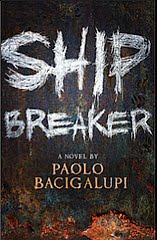First, I must confess my bias: ever since we shared a particularly challenging convention guest appearance a few years back, I have considered Paolo Bacigalupi a fast friend, and I am absolutely delighted by the critical and reader attention his recent books have been getting.
That said—man oh man, this boy can write. And worldbuild, and make you feel for his characters.
Ship Breaker (Little, Brown, 2010) is a YA science fiction novel—more sociological/adventure than hard SF, but one that takes an unflinching look at what life may be like for the majority of people in the Western world given a few more decades of ecological degradation, economic collapse, global climate change, governmental failure, and corporate pillage. I say “the Western world” because in all honesty, the future this book portrays is a world that most human beings on Earth already live in—surviving as scavengers, repurposing scraps, living on the margins and the waste of wealthier cultures, existing to be exploited and discarded.
Bacigalupi doesn’t have to invent the horrors of a future dystopia: all he has to do is transplant them to the Gulf Coast of the United States. Given the nightmare oil spill currently poisoning those waters, his view looks a little prophetic right this second.
Where the inventiveness of his fine worldbuilding shines, however, is in showing the adaptations the still-civilized fragments of the world have made to a post-peak-oil, post-rising-seas world. I was more than a little in love with his clipper ships—especially as seen through the eyes of his scavenger protagonist, Nailer, to whom they represent the only possible escape from a nightmare life of deadly work and fingernail existence that will be all too familiar to anyone who has experienced poverty.
Nailer himself is a deftly realized character, as is his best friend Pima—also a “ship breaker,” someone who works scavenging reusable materials from derelict vessels. They are teens on the verge of adulthood, and this represents a critical problem for them both, as they are growing too large for the brutal work of crawling through the ducts of derelict ships.
If they do not find a solution, they will soon starve.
Nailer has another problem—his father, Richard Lopez, an abusive combat-drug addict who works as an enforcer for a local petty crimelord. When, in the wake of a terrific hurricane (a “city killer,” in the parlance of the book) Nailer and Pima discover a wrecked yacht, they know they must take what salvage from it that they can and flee before Lopez or one of the other adults can take their claim away from them. That is when then they discover that the yacht’s mistress, a wealthy girl their own age, is still alive.
Because he chooses not to kill the girl and to protect her from the adults who would either ransom her home to her family or sell her off for parts, Nailer finds himself involved in an adventure that eventually leads him to piracy on the high seas and international corporate politics of a truly cyberpunk style.
My one real complaint about the book centers on the character of Tool, an evolved dog/human/tiger/hyaena hybrid who is meant to be engineered for blind loyalty, but for whom this proves not to be the case. I adored the character, but the intentional obfuscation of his backstory made him feel a little random—as if he were inserted kind of to be cool, and to give Nailer and the wealthy girl a powerful protector at a necessary juncture.
I wanted something to tie him thematically to the structure of the story, so that his presence would reinforce the points the book was making about choice and destiny—especially as Bacigalupi intentionally points out, repeatedly, how different Tool is from the other engineered creatures. (This is a theme I’ve played with a lot myself, so perhaps I’m overly sensitive to it—Tool and his brothers remind me a lot of my own moreaux, as the setting and salvage economy of Ship Breaker remind me of the world I posited in Hammered and “Two Dreams on Trains,” though in all honesty I think Bacigalupi did a better job with it than I did.)
In any case, that one quibble aside, this is a tidy, satisfying, heartbreaking book, and one I fear is a little too close to reality for me to believe that its happy ending will actually change much of anything. There are famously two kinds of apocalypse stories—the comforting ones, where all the people we don’t like are wiped out, and the few hardy and right-thinking survivors band together to found a world on better principles than the one we lost; and the bleak ones, wherein we do not get a pass from the universe for being so brave and honest, but suffer along with everybody else.
This is not a cozy apocalypse.
It’s a book about lifeboat rules and hard choices and how you survive when the world is ending all around you, and I recommend it without reservation, except to those who already suffer from an excess of existential despair.
Elizabeth Bear is not now anticipating the end of western civilization with any more glee than she was feeling yesterday.










